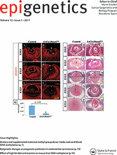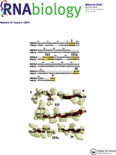
Biochimica et Biophysica Acta-Gene Regulatory Mechanisms
Scope & Guideline
Advancing Insights in Biochemistry and Genetics
Introduction
Aims and Scopes
- Gene Expression Regulation:
Research articles exploring the mechanisms and factors involved in the regulation of gene expression, including transcription factors, enhancers, and silencers. - Post-Translational Modifications:
Studies that investigate how post-translational modifications of proteins influence gene regulation and cellular functions, particularly in the context of diseases. - Non-Coding RNAs:
Papers focusing on the roles of non-coding RNAs, such as microRNAs and long non-coding RNAs, in regulating gene expression and their implications in various biological processes. - Chromatin Dynamics:
Research on how chromatin structure and modifications affect gene expression, including the roles of histone modifications and chromatin remodeling complexes. - Signal Transduction Pathways:
Investigations into how signaling pathways affect gene expression and regulatory mechanisms, particularly in relation to cancer and other diseases. - Epigenetics:
Articles that delve into epigenetic regulation, including DNA methylation and histone modifications, and their role in gene expression and developmental processes. - RNA Processing and Stability:
Research focusing on the mechanisms of RNA processing, stability, and decay, and how these processes impact gene expression.
Trending and Emerging
- Regulatory Non-Coding RNAs:
There is a growing interest in understanding the functions of non-coding RNAs in gene regulation, particularly their roles in cancer and cellular responses to stress. - Interplay of Epigenetics and Gene Regulation:
Research focusing on how epigenetic modifications, such as DNA methylation and histone modifications, interact with transcriptional regulation is on the rise, demonstrating the complexity of gene regulatory mechanisms. - Integrative Genomics and Systems Biology:
Emerging studies are increasingly adopting integrative approaches that combine genomics, transcriptomics, and proteomics to provide a holistic understanding of gene regulation. - Post-Translational Modifications and Disease:
The exploration of how post-translational modifications of proteins influence gene regulation in the context of various diseases, particularly cancer, is becoming more prominent. - Mechanisms of RNA Stability and Processing:
There is an increasing focus on the mechanisms that govern RNA stability, processing, and decay, as these processes are critical for the regulation of gene expression. - Circular RNAs and Their Roles:
Recent interest in circular RNAs has surged, particularly regarding their regulatory roles in gene expression and implications in different diseases.
Declining or Waning
- Classical Genetic Regulation:
Topics related to traditional models of genetic regulation, such as simple promoter analysis, have seen a decrease in frequency, possibly due to the rise of more complex and integrative approaches that encompass broader regulatory networks. - Basic Biochemical Mechanisms:
Basic studies focusing solely on biochemical pathways without integrating gene regulation insights are becoming less common, as the field increasingly emphasizes the interplay between biochemical mechanisms and gene expression. - Single-Gene Studies:
Research centered on the regulation of single genes has waned as the focus shifts towards understanding gene networks and systems biology approaches that consider multiple interacting genes and their regulatory elements. - Static Models of Gene Regulation:
The use of static models to describe gene regulation has decreased as dynamic and systems-level approaches gain prominence, reflecting the need for more comprehensive understanding of regulatory mechanisms.
Similar Journals

Epigenetics
Innovating Knowledge in Cancer Research and Molecular BiologyEpigenetics, published by Taylor & Francis Inc, is a leading journal in the fields of Cancer Research, Medicine (miscellaneous), and Molecular Biology. With an ISSN of 1559-2294 and an E-ISSN of 1559-2308, this journal has been paving the way for groundbreaking research since its inception in 2006, and it continues to play a crucial role in advancing our understanding of epigenetic mechanisms and their implications in health and disease. The journal is highly regarded, ranking in the Q1 category for Medicine and Q2 for both Cancer Research and Molecular Biology according to the 2023 category quartiles. Researchers and professionals in the field will find invaluable insights and innovative studies within its pages, making it an essential resource for those engaged in cutting-edge research. Although the journal is not open access, it encourages a comprehensive understanding through high-quality peer-reviewed content. With its creative exploration of the epigenetic landscape, Epigenetics serves as a vital platform for the sharing of knowledge that could lead to breakthroughs in treatments and therapies.

BIOCHEMICAL AND BIOPHYSICAL RESEARCH COMMUNICATIONS
Fostering innovation in biochemical and biophysical research.BIOCHEMICAL AND BIOPHYSICAL RESEARCH COMMUNICATIONS, published by Academic Press Inc Elsevier Science, stands as a leading periodical in the fields of biochemistry, biophysics, cell biology, and molecular biology. With an ISSN of 0006-291X and an E-ISSN of 1090-2104, this esteemed journal has been a pivotal platform for the dissemination of groundbreaking research since its inception in 1959, continuing to publish influential findings through at least 2024. It holds a commendable Q2 ranking in Biochemistry and Q1 status in Biophysics as of 2023, reflecting its high impact and relevance in the field, supported by its strong Scopus rankings—ranking #43 in Biophysics and maintaining a presence in the top quartiles of several related categories. Although it is not an open-access journal, it provides critical insights and essential data that cater to researchers, professionals, and students keen on advancing their understanding of complex biochemical and biophysical processes. Its significant contributions to the scientific community underscore the importance of this journal as a reference point for innovative research and collaborative discourse.

MOLECULAR BIOLOGY
Innovating Insights into Biochemistry and GeneticsMOLECULAR BIOLOGY, published by PLEIADES PUBLISHING INC, serves as a vital repository for the dissemination of innovative research within the fields of biochemistry, genetics, and molecular biology. With an ISSN of 0026-8933 and an E-ISSN of 1608-3245, this journal has been a mainstay in the scientific community since its inception, embracing its deep historical roots from 1971 to the present. Recognized for its qualitative contributions, MOLECULAR BIOLOGY is ranked in the Q3 quartile for Biophysics and Q4 for Structural Biology, placing it among select journals in its domain. Researchers and students alike benefit from its rigorous peer-reviewed articles, which focus on all aspects of molecular mechanisms and interactions. The journal's inclusion in prestigious databases underlines its commitment to academic excellence. The editorial board is dedicated to fostering the sharing of influential findings, making it an essential resource for advancing knowledge and innovation in molecular biology.

JOURNAL OF MOLECULAR MEDICINE-JMM
Championing High-Quality Research in Biomedical Science.JOURNAL OF MOLECULAR MEDICINE (JMM) is a premier publication dedicated to advancing the field of molecular medicine, encompassing critical areas such as drug discovery, genetics, and biochemistry. Published by Springer Heidelberg in Germany, this influential journal has established its significance within the academic community, achieving an impressive Q1 ranking across multiple categories as of 2023, including Drug Discovery, Clinical Genetics, and Molecular Medicine. With a focus on publishing high-quality research and novel insights, JMM appeals to a diverse audience of researchers, professionals, and students passionate about the molecular underpinnings of health and disease. The journal, which has seen a convergence of relevant research spanning from 1976 to 2024, is instrumental in showcasing groundbreaking studies that push the boundaries of knowledge in molecular therapeutics and biomedical science. While it does not offer open access, the rigor of its peer-reviewed content ensures that each publication is a valuable addition to the scientific discourse surrounding molecular medicine. For comprehensive studies and reviews that highlight the intersection of molecular biology and clinical application, look no further than JOURNAL OF MOLECULAR MEDICINE.

MOLECULAR GENETICS AND GENOMICS
Advancing the Frontiers of Genetic ResearchMOLECULAR GENETICS AND GENOMICS is a distinguished journal published by SPRINGER HEIDELBERG that serves as a pivotal platform for the communication of cutting-edge research and developments in the fields of genetics, molecular biology, and medicine. With an ISSN of 1617-4615 and an E-ISSN of 1617-4623, this journal has established itself since its inception in 1994 as a significant resource for researchers aiming to explore the complexities of genetic interactions and their implications in various biological systems. The journal is indexed in Scopus, with respectable rankings in the Genetics, Molecular Biology, and Biochemistry categories, showcasing its position within the academic community. It is categorized in the 2023 rankings as Q3 in Genetics, Q2 in Medicine (miscellaneous), and Q3 in Molecular Biology, indicating its relevance and quality in the scientific discourse. The journal also promotes open access, ensuring that researchers and professionals can easily share and advance knowledge in the rapidly evolving disciplines of molecular genetics and genomics. As the journal continues to bridge the gap between experimental and theoretical research, it presents a vital space for innovation, fostering collaborations and scholarly exchange among its readership.

RNA Biology
Showcasing Breakthroughs in RNA and BeyondRNA Biology is a premier journal published by Taylor & Francis Inc, focusing on the intricate and evolving field of RNA research. With an ISSN of 1547-6286 and E-ISSN of 1555-8584, this journal has established itself as an essential resource for professionals, researchers, and students engaged in both molecular and cell biology. Recognized in the 2023 quartile rankings, RNA Biology holds a distinguished Q1 category in Molecular Biology and a Q2 category in Cell Biology, indicative of its significant impact and reputation within the scientific community. The journal emphasizes the importance of RNA in various biological processes, highlighting both fundamental and applied aspects, which is crucial for advancing our understanding of gene expression and regulation. With a strong Scopus ranking, including Rank #105/410 in Molecular Biology and Rank #83/285 in Cell Biology, RNA Biology is not just a publication but a vital platform for sharing groundbreaking findings and insights into RNA research. With a convergence that spans from 2004 to 2024, the journal promises to continue its legacy of excellence in disseminating important discoveries in RNA science, contributing richly to ongoing scientific dialogue and innovation.

Epigenetics & Chromatin
Illuminating the Complexities of ChromatinEpigenetics & Chromatin, published by BMC, is a leading open-access journal that has been at the forefront of research in the fields of genetics and molecular biology since its inception in 2008. With an impressive Q1 category ranking in both Genetics and Molecular Biology as of 2023, this journal is pivotal for researchers and professionals aiming to explore the complexities of gene regulation and chromatin dynamics. The journal is renowned for its commitment to disseminating high-quality research, featuring diverse articles ranging from original research to comprehensive reviews. It enjoys a significant impact within the academic community, evidenced by its Scopus rankings that place it among the top 30% of journals in Genetics and the top 40% in Molecular Biology. With a dedicated open-access model, Epigenetics & Chromatin ensures that its comprehensive content is readily accessible to researchers globally, fostering collaboration and innovation across the scientific landscape. Located in the UK, the journal continues to attract a diverse audience of scholars and practitioners passionate about understanding the intricate layers of epigenetic regulation.

ACTA BIOCHIMICA POLONICA
Connecting Discoveries in Genetics and Molecular BiologyACTA BIOCHIMICA POLONICA (ISSN: 0001-527X, E-ISSN: 1734-154X) is a distinguished journal published by the ACTA BIOCHIMICA POLONICA in Poland, with a rich history dating back to 1955. As a prominent platform for disseminating research, it currently holds a Category Quartile of Q3 in the fields of Biochemistry, Genetics, and Molecular Biology, reflecting its commitment to advancing knowledge in these critical areas. This journal is indexed in Scopus, ranking 124 out of 221, placing it in the 44th percentile among general biochemistry, genetics, and molecular biology journals. Although it does not operate under an open-access model, ACTA BIOCHIMICA POLONICA remains a vital resource for researchers, professionals, and students seeking to delve into the latest developments and discoveries in biochemistry and molecular biology. Its strategic focus on contemporary topics ensures that it plays an essential role in shaping future scientific inquiries and fostering collaboration across various disciplines.

GENE
Advancing the Frontiers of Genetic ResearchGENE, an esteemed journal published by Elsevier, serves as a vital resource for researchers and professionals in the fields of genetics and medicine. With an ISSN of 0378-1119 and an E-ISSN of 1879-0038, this scholarly journal has been at the forefront of genetic research since its inception in 1976 and is set to continue until 2025. Situated in the Netherlands, GENE is recognized for its significant contributions, reflected in its Q2 ranking in both Genetics and Miscellaneous Medicine categories for 2023. This positioning within the Scopus rankings demonstrates its impact and relevance in a competitive field, where it holds the rank of #129 out of 347 in Genetics, placing it within the 62nd percentile. Although it does not offer open access options, GENE provides invaluable insight into contemporary genetic research, thereby fostering academic discussions and advancements. Researchers, professionals, and students alike will find GENE an essential platform for disseminating knowledge and exploring innovative developments in genetics and associated sciences.

RNA
Unraveling the Mysteries of Molecular BiologyRNA is a premier journal in the field of molecular biology, published by COLD SPRING HARBOR LAB PRESS, PUBLICATIONS DEPT. With an impressive impact factor reflected by its Q1 status in the Molecular Biology category, this journal has established itself as an essential resource for researchers and professionals dedicated to understanding the role of RNA in biological processes. Spanning over two decades of impactful research from 1995 to 2024, RNA covers a broad spectrum of topics, including RNA biology, gene regulation, and therapeutic innovations. Researchers can access its extensive array of original research articles, reviews, and commentary, making it a vital conduit for new discoveries and methodologies in the field. With its high ranking within Scopus at Rank #115/410 and a 72nd percentile ranking in the domain of Biochemistry, Genetics, and Molecular Biology, RNA continues to advance the understanding of RNA and its critical contributions to life sciences.